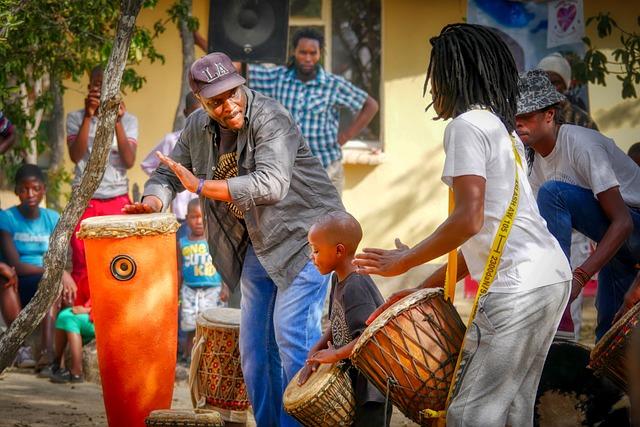In a sobering analysis of teh current state of civil society in Zimbabwe, the latest report from the International Federation for Human rights (FIDH) sheds light on the increasingly perilous landscape for civic engagement and activism in the country. As zimbabwe grapples with economic and political challenges, the report details a concerning trend of operational obstacles and legal threats that are constraining the activities of non-governmental organizations and grassroots movements. With new restrictions on freedoms of assembly,expression,and association,civic space is rapidly diminishing,raising alarms among human rights advocates and prompting urgent calls for accountability. This article delves into the key findings of the FIDH report, examining the implications of these challenges for civil society’s role in fostering democracy and protecting human rights in Zimbabwe.
Zimbabwe’s Civil Society Under Siege amid Rising Operational Barriers
The landscape for civil society in Zimbabwe has dramatically shifted, with numerous obstacles impeding the work of non-governmental organizations (NGOs) and activists. According to recent findings published by the International federation for Human Rights (FIDH), the operational surroundings has become increasingly hostile, characterized by a surge in legal challenges and bureaucratic hurdles. Amidst this climate of repression,many organizations face intimidation,harassment,and direct threats,impeding their ability to advocate for human rights and engage with local communities. Essential activities such as community outreach, advocacy, and research are falling victim to regulatory constraints that prioritize governmental oversight over civic engagement.
Key barriers identified include:
- Restrictive Registration Laws: Lengthy and convoluted processes deter new organizations from forming.
- Increased Regulatory Scrutiny: Government agencies effectively monitor and control NGOs’ actions.
- Financial Restrictions: Tightened regulations around funding sources limit financial viability.
- Harassment of Activists: Threats and violence against civil society leaders escalate fear and deter participation.
It is indeed critical that these issues come to light, forcing both local actors and international stakeholders to advocate for a more supportive environment for civil society. The recent report outlines the urgent need for reforms to dismantle these barriers, allowing for a robust civic space where free expression is not merely tolerated but celebrated. Without immediate action, the potential for civic engagement in Zimbabwe hangs in the balance, stifling the very essence of democracy.
Legal Threats Intensify: The Impact on Human Rights Advocacy in Zimbabwe
The recent report from the International Federation for Human Rights (FIDH) highlights a pressing reality: the landscape for human rights advocacy in Zimbabwe has become increasingly perilous. Civil society organizations are grappling with a spike in legal threats, as both state and non-state actors employ judicial harassment as a tactic to silence dissent. Anti-non-governmental association (NGO) legislation is disproportionately wielded against activists, creating a chilling effect on those fighting for justice. Advocates face not only debilitating bureaucratic hurdles but also escalating hostility that stifles their operational capacity,pushing many to self-censor and retreat from their public roles.
Moreover, the repercussions of these legal challenges extend beyond immediate threats to individual activists. The consolidation of legal obstacles contributes to a broader erosion of civic space, undermining the foundational principles of democracy. This situation fosters an environment of fear that disrupts community mobilization and advocacy efforts. Key impacts include:
- Increased self-censorship: Many activists hesitate to voice dissenting opinions for fear of legal retribution.
- Limited funding: International donors are wary of investments in a tumultuous legal climate, leading to funding shortages for essential projects.
- Potential closure of NGOs: Heightened legal scrutiny can result in the shutdown of organizations dedicated to promoting human rights.
| Challenge | Impact on Civil Society |
|---|---|
| Legal Harassment | Fostering a culture of fear |
| Bureaucratic Hurdles | Operational paralysis |
| Funding Restrictions | Reduced capacity and program limitations |
diminishing Freedoms: Documenting the Erosion of Civic Space
Recent findings reveal a troubling trend for civil society in Zimbabwe, where operational obstacles and legal threats have become increasingly pervasive. In light of the FIDH’s new report, it is evident that both registered and informal organizations face meaningful challenges that impede their ability to function effectively. The worsening climate of fear and repression has led to a substantive decline in advocacy efforts,which are crucial for democratic engagement and human rights promotion. Key factors contributing to this erosion include:
- Restrictive legislation: Laws governing public assemblies and freedom of expression have been tightened, creating an environment where civic engagement is heavily monitored and often criminalized.
- intimidation tactics: Activists and members of civil society organizations report instances of harassment and intimidation by state agents, which serve to silence dissent and discourage participation in civic activities.
- Resource depletion: Legal challenges and heightened scrutiny lead to a decline in funding opportunities, exacerbating the operational struggles faced by grassroots organizations.
The ramifications of this crisis extend beyond individual organizations, affecting the very fabric of society in Zimbabwe. As civic space diminishes, it becomes increasingly difficult for the population to engage with governance processes or hold authorities accountable. The report emphasizes the urgent need for international support and attention to address the barriers imposed on civil society.Below is a summary of the key issues impacting civic engagement:
| Challenge | Impact |
|---|---|
| Restrictive Laws | Stifles freedom of assembly and expression |
| Harassment of Activists | Fosters a culture of fear |
| Lack of Funding | Limits capacity for advocacy and outreach |
Recommendations for Strengthening Civil Society Resilience in Zimbabwe
To enhance the resilience of civil society in Zimbabwe, it is essential to foster a supportive ecosystem that empowers grassroots organizations and advocates for policy reform. Key recommendations include:
- Strengthening Legal Frameworks: Advocate for the revision of restrictive laws that hinder the operations of civil society organizations (CSOs),ensuring that legislation promotes freedom of association and expression.
- Building Capacity: Implement training programs aimed at enhancing the skills and capacity of local CSOs in areas such as fundraising, strategic interaction, and advocacy.
- Encouraging Coalition Building: Promote alliances among CSOs to strengthen collective advocacy efforts and share resources effectively.
- International Support and Solidarity: Engage international partners to provide technical and financial support, while ensuring that zimbabwean CSOs have a platform to share their challenges and successes.
Additionally, it is crucial to address the psychological and physical safety threats faced by civil society actors. Initiatives should focus on:
- Establishing Safe Spaces: Create confidential support networks for activists and organizations targeted by state actors.
- Enhancing Communication Security: Provide training on digital security practices to protect sensitive details and facilitate secure communication.
- Advocating for Protection Mechanisms: Work towards establishing legal protections and mechanisms for whistleblowers and human rights defenders.
International Response: The Role of Global Actors in Supporting Zimbabwe’s Civic Space
The increasing challenges faced by Zimbabwe’s civil society have not gone unnoticed by the international community.A broad coalition of global actors has expressed concern over the deteriorating operational environment for NGOs and civic organizations in the country. International NGOs, diplomatic missions, and human rights watchdogs have taken various approaches to address the crisis, emphasizing the need for accountability and reform in Zimbabwe’s governance. Their efforts include:
- diplomatic Pressure: Engaging with the Zimbabwean government through official channels to advocate for the protection of civic freedoms.
- Funding and Support: Providing financial resources and technical assistance to local organizations facing operational restrictions.
- Monitoring and Reporting: Documenting human rights abuses and legal challenges against civil society actors to inform global advocacy efforts.
Additionally, regional organizations such as the African Union (AU) and the Southern African Development Community (SADC) have occasionally intervened to promote dialog and peace-building initiatives. These efforts are crucial in countering authoritarian tactics and reaffirming commitment to democratic principles. Strengthening a unified global response will involve:
- Coalition Building: Forming partnerships among international NGOs, human rights activists, and regional bodies to amplify voices advocating for civic space.
- Public Awareness Campaigns: Leveraging media to highlight the plight of Zimbabwean civil society and mobilize global public opinion.
- Legal Advocacy: Supporting local lawyers and advocacy groups in challenging unjust laws and policies in Zimbabwean courts.
Future Prospects: Navigating challenges and Reclaiming Civic Space in Zimbabwe
The current climate in Zimbabwe presents significant challenges for civil society organizations striving to promote human rights and accountability. Deteriorating political conditions, coupled with heightened government surveillance and censorship, have left many activists grappling with operational obstacles. The new report by the FIDH underscores that restrictive laws are increasingly being wielded as weapons against non-governmental organizations, curtailing their ability to operate freely. As these entities face legal threats, the risks associated with advocacy work escalate, making it crucial for local and international stakeholders to reinforce solidarity in support of civic engagement.
In response to these adversities, there is a growing call for strategic initiatives aimed at reclaiming civic space. Civil society must adopt innovative approaches to advocacy and mobilization, fostering grassroots movements that emphasize community involvement and empowerment. Collaborative partnerships across borders will also play a pivotal role in bolstering resilience and amplifying voices of dissent against oppressive regimes. The table below highlights some potential strategies that organizations can implement to navigate this storm:
| Strategy | Description |
|---|---|
| Digital Advocacy | Utilizing online platforms to raise awareness and mobilize support for human rights issues. |
| Legal Empowerment | Providing legal resources and training to help civil society navigate the legal landscape. |
| Coalition Building | Creating alliances with other NGOs and community groups to strengthen collective action. |
| International Solidarity | Engaging global human rights organizations to amplify local struggles and attract attention. |
The Conclusion
the findings presented in the FIDH report underscore a troubling reality for civil society in Zimbabwe, where the foundations of democratic engagement are increasingly undermined by a combination of operational hurdles and legal challenges. as civic organizations strive to fulfill their roles as watchdogs and advocates for human rights, they face a landscape marked by repression and intimidation. The insights from this report not only highlight the urgent need for national and international stakeholders to safeguard civil liberties in Zimbabwe but also call attention to the resilience of those who continue to fight for a democratic space. As the situation unfolds, it is imperative that the global community remains engaged and vigilant, advocating for policies that support the essential work of civil society and protect the voices that champion justice and accountability in Zimbabwe.

